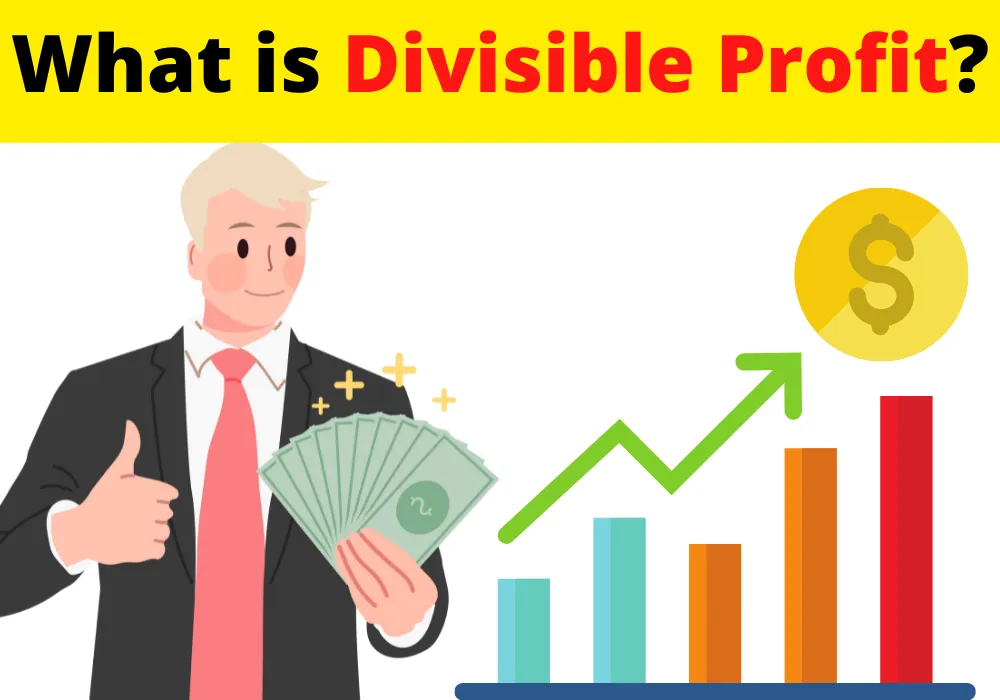Contents
- 1 What is Divisible Profit?
- 2 Principles for determination of Divisible Profits
- 3 Dividend
- 4 Source of ‘Dividend’
- 5 Declaration of ‘Dividend’ out of reserves
- 6 Payment of ‘Dividend’ out of capital profits
- 7 Types of ‘Dividend’
- 8 Declaration of dividend
- 9 Deposit the amount of dividend
- 10 Other provisions regarding dividends
- 11 Corporate dividend tax
- 12 Final Words
Many people are asking what is divisible profit. A lot of people are confused because they think that when they have a business, they can only make profit by selling goods. In reality, businesses can make profit by charging people for goods and services. If a business makes a profit by charging people for goods or services, then this business is considered to be making a divisible profit.

This blog will help you understand the components of profit and what is divisible profit.
What is Divisible Profit?
The portion of profit, which can lawfully be distributed to the shareholders of the company by way of dividend, is called the ‘Divisible Profit’.
The term ‘Divisible Profit’ is not defined in the establishment act and the act does not specify what is meant by ‘profit’. Only section 205 of the act lays down that no dividend can be announced or paid by a company except out of current profits or past undistributed profits or both, arrived at after accommodating for deprecation or money provided by the govt. for payment of dividend in pursuance of a guarantee given by the govt.
Principles for determination of Divisible Profits
According the company rules: The articles of alliance are the rules of the company. The directors are entitled to give out the profits under rules.
Profit not out of capital: The capital can not be accustomed to pay dividend. The revenue profits can be accustomed for the payment of dividend.
Approval of shareholders: In the annual general meeting shareholders may accept the rate of profit recommended by the directors.
Right of proposal: The directors can motive the rate of dividend out of divisible profits.
Undistributed profit: It is the right of the directors to use like profit for the payment of dividend at the end of a year. It is a revenue of the aliment year.
Depreciation: Before declaring revenue gain the depreciation on fixed assets must be charged.
Capital profits: Under certain conditions the capital gain can be used to pay dividend but articles association should allow the distribution of capital profit as dividend.
Capital loss: Inspite of capital loss the dividend can be reward out of revenue profits. The capital gain must be used to eliminate capital loss first and then surplus can be used to pay dividends.
Loss of provision year: If a company suffers a loss in one year but earns gain next year. Such loss can be setteled by the company from benefit of the current year.
Revaluation of assets: After the revaluation of asset, if it become surplus then it can be accustomed after realization. Profit may be rewarded after selling the assets.
Revenue profits: According the principle of divisible gain dividend must be paid out of revenue profit.
Asset goodwill written down & up: If a company has written down good will out of gains, it may also edit up this asset, with the appreciation. But the value written up should not surplus than the true value.
Dividend
The term ‘Dividend’ has been described under section 2(35) of the companies act,2013.
Corresponding to the generally received definition, “Dividend” means the gain of a company, which is not reserved in the business and is given out among the shareholders in proportion to the amount reward-up on the shares held by them.
Source of ‘Dividend’
‘Dividend’ can be repaid out of following sources:
- Out of current year’s gains.
- Out of past year’s gains lying in profit and loss account.
- Out of past year gains earned and transferred to reserves.
- Out of money offered by central government or state govt. for payment of dividend.
Declaration of ‘Dividend’ out of reserves
For the purpose of proclsim of ‘Dividend’ out of reserves, company shall have to accomplish following conditions:
- The rate of ‘Dividend’ shall not cross the average of 3 years immediately preceding that year.
- The total amount to be drawn from such accumulated gain shall not exceed 1/10th of the sum of its repaid-up share capital and free reserves as arising in the latest audited financial statement.
- The amount so secluded shall first be used to set off the losses incurred in the financial year in which dividend is announced before any dividend in respect of equity shares is declared.
- The balance of reserves after such secluded shall not fall below 15% of its reward up share capital as appearing in the latest audited financial statement.
- No company shall announce dividend unless previous losses and depreciation not provided in previous year or years are set off against gain of the company of the current year.
Payment of ‘Dividend’ out of capital profits
A company can pay ‘Dividend’ out of capital gains provided:
- These are register in cash.
- These gains exists after bonafide revaluation of assets and liabilities.
- The articles of the company grant for the same.
Capital gains not available for ‘Dividend’ are:
- Securities premium reserve
- CRR
- Gains on reissue of shares.
- Any capital gains transferred to capital reserve.
Types of ‘Dividend’
- Cash dividend
- Stock dividend
- Property dividend
- Scrip dividend
Declaration of dividend
Dividend shall be announced only on the recommendation of the board, made at a meeting of the board.

Dividend shall be announce only at annual general meeting of the company.
Company shall not announce dividend exceeding the rate recommended by the board. However, member in such meeting may bring down the rate of dividend as recommended by board.
Deposit the amount of dividend
- Company shall stake amount of dividend in separate account with a scheduled bank.
- Such amount must be staked within 5 days from the date of declaration of dividend.
- Dividend must be reward within 30 days from the date of declaration of dividend.
- Dividend shall be reward in cash i.e. it shall not be repaid in kind.
Other provisions regarding dividends
- A dividend once announce becomes a debt.
- A dividend once announced cannot be revoked, excluding with the consent of the shareholders.
- The directors become generally liable for illegal declaration and payment of dividend.
- Dividend shall be rewarded to the registered shareholders or to their orders or to their bankers.
- A company shall allow dividend in cash only.
Corporate dividend tax
- CDT is in inclusion to the income tax chargeable in respect of the total income of a domestic company.
- CDT is chargeable on any amount announced, given-out or paid by such company by way of dividend.
- The dividend chargeable to CDT may be out of the current gains or accumulated profits.
- Present charge of CDT is 20.56%.
Final Words
Divisible profit is the amount of profit that can be distributed among the company’s owners. The owner’s share of divisible profit is the net profit minus the total cost to the owners of the business. This includes all expenses such as wages, salaries, dividends, interest, rent, and other cost
We hope you found our article helpful about the definition of divisible profit. It’s a great place to start for those who are new to the world of business and have their own questions. If you would like to learn more, please visit our website at www.edukar.in
Thank you for reading, we would love to hear from you!



![Packing Class 9 Questions and Answers [Class 9 English Beehive Chapter 7 ] Packing Class 9 Questions and Answers [Class 9 English Beehive Chapter 7 ]](https://edukar.in/wp-content/uploads/2023/01/Packing-Class-9-Questions-and-Answers-1024x640.webp)



![Nine Gold Medals Questions and Answers 2023 [ICSE Class 10] Nine Gold Medals Questions and Answers](https://edukar.in/wp-content/uploads/2023/01/Nine-Gold-Medals-Questions-and-Answers-1024x640.webp)
![A House Is Not A Home Question Answer [Class 9 English Moments Chapter 8] A House Is Not A Home Question Answer](https://edukar.in/wp-content/uploads/2023/01/A-House-Is-Not-A-Home-Question-Answer-1024x640.webp)

![No Men Are Foreign Class 9 Question Answer [NCERT] No Men Are Foreign Class 9 Question Answer](https://edukar.in/wp-content/uploads/2023/01/No-Men-Are-Foreign-Class-9-Question-Answer-1024x640.webp)

![Footprints Without Feet Question Answer [Class 10 Chapter 5 NCERT Solutions] Footprints Without Feet Question Answer](https://edukar.in/wp-content/uploads/2022/12/Footprints-Without-Feet-Question-Answer-1024x640.webp)
![Evans Tries An O Level Questions Answers [Class 12 NCERT Solutions] Evans Tries An O Level Questions Answers class 12](https://edukar.in/wp-content/uploads/2023/01/Evans-Tries-An-O-Level-Questions-Answers-class-12-1024x640.webp)
![The Tale of Custard The Dragon Question Answers [Class 10 English Poem by Ogden Nash] The Tale of Custard The Dragon Question Answers](https://edukar.in/wp-content/uploads/2022/12/The-Tale-of-Custard-The-Dragon-Question-Answers--1024x640.webp)
![The Road Not Taken Question Answer [Class 9-NCERT] The Road Not Taken Question Answer](https://edukar.in/wp-content/uploads/2023/01/The-Road-Not-Taken-Question-Answer-1024x640.webp)
